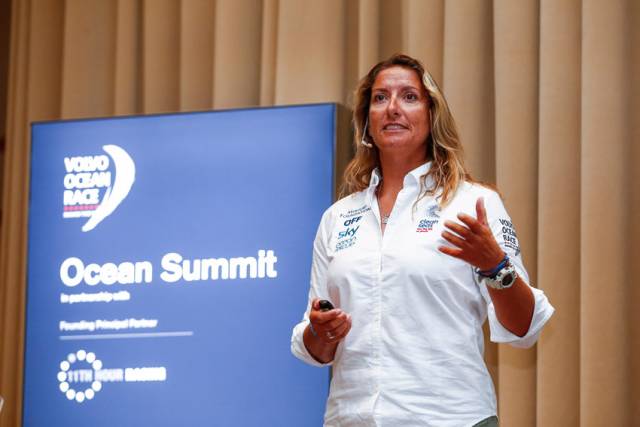#MarineScience - Millions of tiny particles of plastic have been detected in European waters in groundbreaking scientific research conducted as part of the Volvo Ocean Race.
Using data collected by Turn the Tide on Plastic, which features Ireland’s own Annalise Murphy on deck, marine experts have identified over three million micro plastic particles per square kilometre of ocean.
The sub-surface data on micro plastic pollution levels was collected using a state-of-the-art instrument on board the Volvo Ocean 65 racing yacht.
The initial results, gathered during the Prologue stage and Leg 1 of the race between Lisbon and Alicante, were presented by Dr Toste Tanhua during the first morning of the two-day Volvo Ocean Race Ocean Summit, held in Cape Town stopover on Thursday (7 December).
The samples collected during Leg 2 are currently being analysed and results will be revealed in due course.
“Our initial findings suggest that the levels of micro plastic in the ocean are significantly higher than we first expected,” said Dr Tanhua, who works at GEOMAR, an ocean research institute in Kiel, Germany.
“This is alarming as the micro plastic not only harms a wide range of marine life, but, through entering the food chain, in species such as tuna and mackerel, can cause harm to humans, too.”
Micro plastic refers to small particles of plastic often invisible to the naked eye – and which can take thousands of years to degrade.
Dr Tanhua continued: “Existing scientific data only accounts for around 1% of all plastic in the ocean – but thanks to the support of Volvo Ocean Race and Volvo Cars, and the efforts of the Turn the Tide on Plastic team in conducting this research, we’re building a knowledge base which is essential to ocean science around the globe.”
The Volvo Ocean Race Science Programme is funded by Volvo Cars, who are donating €100 from the first 3,000 sales of the new V90 Cross Country Volvo Ocean Race edition to support the initiative.
Consisting of three key pillars — meteorological data collection; scientific drifter buoy deployment; and on-board analysis of key metrics for ocean health (including salinity, partial pressure of CO2, dissolved CO2 and Chlorophyll-a) — the Science Programme aims to create a snapshot of the health of the oceans to help scientists worldwide.
Speakers at the second Ocean Summit of the 2017-18 Volvo Ocean Race included The Ocean Cleanup founder Boyan Slat, WWF’s John Duncan and Volvo Ocean Race skippers Charlie Enright of Vestas 11th Hour Racing and Dee Caffari of Turn the Tide on Plastic.
“This is a groundbreaking project, bringing sport and science together,” said Caffari, who is leading the team amplifying the United Nations Environment Clean Seas campaign. “As round-the-world sailors, we have seen first hand the growing problem of marine debris and plastic pollution – and now we are collecting reference data for scientists around the globe.
“The power that the Race’s sustainability focus and this Ocean Summit are having in Cape Town is incredible, and it’s fantastic to see the enthusiasm in the Host Cities that we visit.
“People are doing the little things – refusing plastic bags, disposable coffee cups and drinking straws – and through these very simple actions, we can make a big impact.”
































































